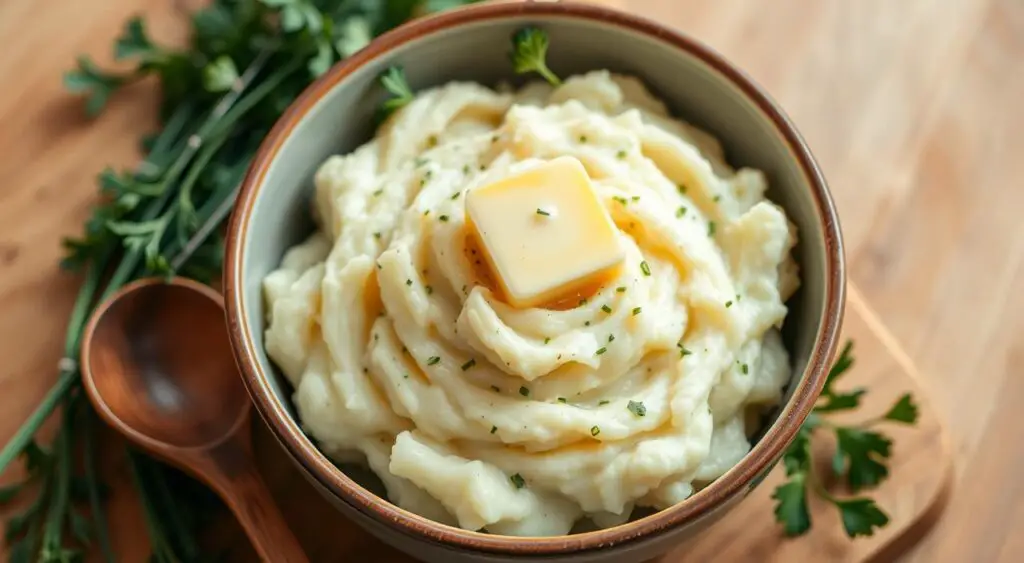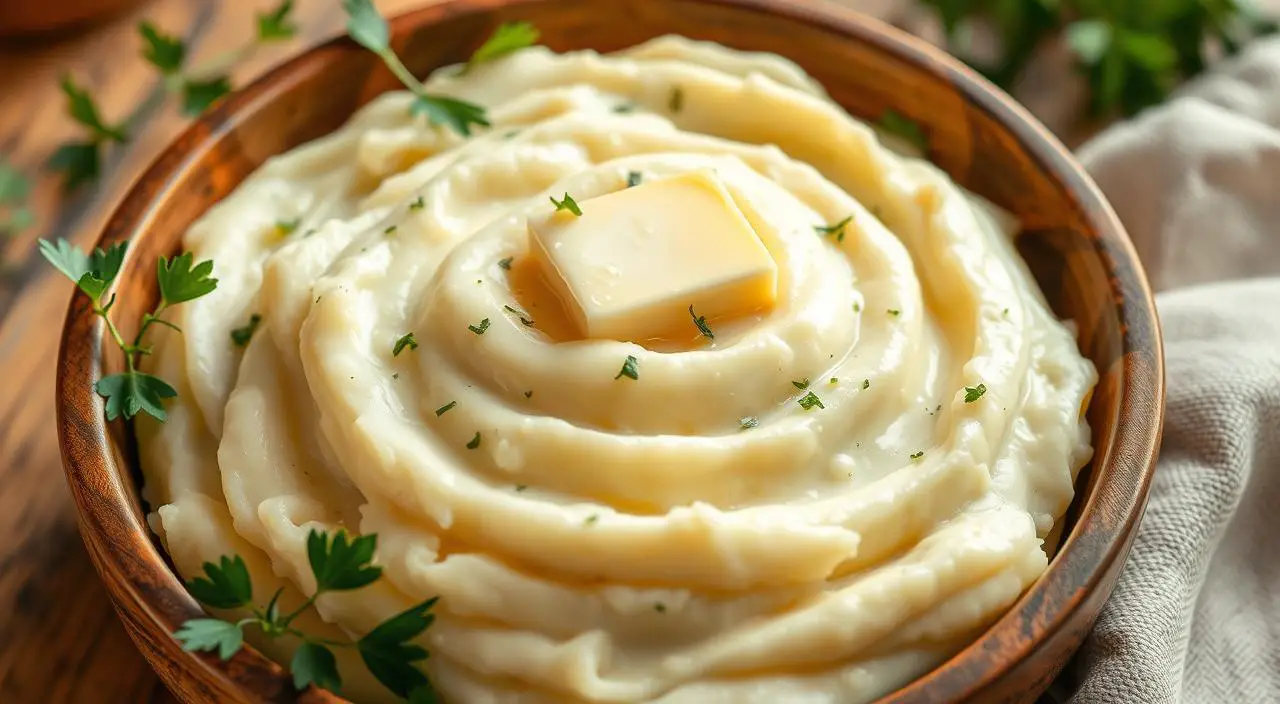Want to make creamy, smooth, and buttery mashed potatoes for your holiday guests1? This guide will show you how to pick the best potatoes and mash them perfectly. You’ll learn the secrets to making mashed potatoes that are a hit at any festive event.
Key Takeaways
- Russet or Yukon Gold potatoes are the preferred varieties for creamy mashed potatoes
- Chopping potatoes before boiling ensures even cooking and a smooth texture
- Incorporating butter, cream cheese, and half-and-half creates a rich, creamy consistency
- Proper seasoning with salt, pepper, and garlic enhances the buttery flavor
- Mashed potatoes can be made ahead and refrigerated or frozen for convenient serving
The Perfect Creamy Mashed Potatoes Recipe
Getting the perfect creamy mashed potatoes starts with the right ingredients and tools. Whether it’s for a family dinner or a holiday feast, mastering this dish can make any meal better.
Essential Ingredients for Success
The secret to creamy mashed potatoes is in the ingredients. Use 4 lbs of russet or Yukon Gold potatoes, 1 1/4 cups of hot whole milk, 16 Tbsp of unsalted butter, and 1 1/2 tsp of salt2. Yukon Golds add a rich flavor, while russets make them fluffy.
Understanding Potato Types and Selection
Not all potatoes are the same for mashed potatoes. Russet potatoes are light and airy, while Yukon Golds are richer3. Picking the right potato is key for the right taste and texture.
Required Kitchen Tools
Having the right tools is also crucial. You’ll need a large pot for boiling, a masher or ricer for mashing, and a stand mixer for the smoothest texture2.
With the right ingredients and tools, you’re on your way to making the perfect creamy mashed potatoes. They’re sure to impress your guests and satisfy your family’s taste buds.
Step-by-Step Cooking Process
Making creamy mashed potatoes is easy and fun. Start by peeling and rinsing the potatoes. Cut them into halves or quarters4.
Boil the potatoes in salted water for 20-25 minutes. They should be soft enough to be pierced with a fork4. After boiling, drain the potatoes well. Then, put them back in the pot over low heat to dry out any extra moisture.
Now, mash the potatoes with a potato masher or ricer until they’re smooth5. Add hot milk slowly while mixing. Then, add softened butter one tablespoon at a time. Keep mashing until the potatoes are just right5.
Season with salt to taste. But remember, don’t overmix. This can make the potatoes gummy5.
The whole process takes about 40 minutes4. For the best results, use the right potatoes. Sebago in Australia, Russet in the US, and Maris Piper in the UK are good choices4.
“The key to creamy, lump-free mashed potatoes is to thoroughly cook the potatoes until they are soft and tender, then mash them with a combination of warm milk and butter.” –5
Secret Ingredients for Ultimate Creaminess
To make your mashed potatoes super creamy, you need more than just basic stuff. Use butter, cream cheese, and dairy to get a smooth and rich texture6.
The Role of Butter and Dairy
Unsalted butter at room temperature is key for creamy mashed potatoes6. Add the butter slowly, mixing it well with the hot potatoes7. Also, add a bit of heavy cream or half-and-half, warmed up, for extra creaminess6.
Seasoning Tips and Techniques
Seasoning matters a lot. Salt and pepper are must-haves, but try adding garlic, herbs, or nutmeg for more flavor7. Season carefully, tasting and adjusting as you go, to get the flavors just right.
Temperature Control Tips
Keeping the right temperature is important. Make sure all dairy, like cream cheese, is at room temperature or warmed before mixing with the potatoes7. This helps blend everything smoothly and brings out the best flavors8.
Mastering dairy and seasoning will make your mashed potatoes creamy and irresistible. Your guests will definitely want more.
“The secret to truly decadent mashed potatoes lies in the perfect balance of butter, cream cheese, and temperature control.”
Common Mistakes to Avoid When Mashing
To get the perfect creamy mashed potatoes, you need to pay close attention. One big mistake is overworking the potatoes, which makes them sticky and gluey9. To prevent this, use a food mill or potato ricer instead of a food processor. This way, you avoid over-mashing the potatoes9.
Another mistake is ending up with watery mashed potatoes. This happens if you don’t drain the potatoes well after boiling. Let them steam to get rid of extra moisture10. Also, add warm dairy like milk or cream to the hot potatoes. This helps it mix in smoothly10.
Lastly, a lumpy texture comes from not cooking the potatoes enough before mashing9. Make sure the potatoes are tender and mash easily for a smooth texture10. Don’t forget to season with salt. Use about one tablespoon of salt per pound of potatoes for the right flavor91011.
By avoiding these mistakes and following the right steps, you can make perfectly creamy, lump-free mashed potatoes91011.

Make-Ahead Methods and Storage
Preparing mashed potatoes ahead of time can be a big help12. The casserole mashed potato recipe can be made a few days early and still taste great12. You can keep the potatoes in the fridge for up to five days and they’ll still warm up nicely12.
Adding sour cream and cream cheese keeps the potatoes moist. Sour cream makes them light and fluffy, while cream cheese makes them slightly denser12. To serve, heat the dish in the oven for about 45 minutes12.
Refrigeration Guidelines
Mashed potatoes can be made 1-2 days before and stored in the fridge. Keep them in an airtight container for up to 4 days12. To serve, reheat them in the oven, microwave, or slow cooker13.
Freezing and Thawing Instructions
For longer storage, you can freeze mashed potatoes. Cool them down and put them in a freezer-safe container for up to 1 month12. To serve, thaw them in the fridge overnight12.
Reheating Techniques
Reheating mashed potatoes is easy. Preheat your oven to 350°F (177°C) and reheat them, covered, for 20-30 minutes12. Add a bit of extra butter or milk to keep them creamy12. Or, you can reheat them on the stovetop over low heat, stirring often and adding liquid as needed12.
Learning to make mashed potatoes ahead of time can save you a lot of time12. It ensures your guests enjoy creamy and delicious potatoes every time12. This technique is great for both home cooks and professional chefs12.
| Reheating Method | Instructions |
|---|---|
| Oven | Preheat oven to 350°F (177°C). Reheat mashed potatoes, covered, for 20-30 minutes. |
| Stovetop | Reheat on low heat, stirring occasionally and adding liquid as needed. |
| Microwave | Use a microwave-safe bowl and stir every 5 minutes until hot. |
| Slow Cooker | Heat on high for 30 minutes, then switch to low for up to 3 hours. |
Make-ahead mashed potatoes are very versatile and convenient12. They’re perfect for any occasion, from holiday feasts to weeknight dinners12. Having them ready to serve can save you time and ensure a tasty meal12.
Best Potato Varieties for Mashing
Choosing the right potato variety is key to making creamy mashed potatoes. Russet potatoes and Yukon Gold potatoes are top picks. They have a lot of starch, making them perfect for mashing141516.
Russet potatoes are great for classic mashed potatoes. They soak up liquids well, giving a fluffy texture14. Yukon Gold potatoes add a buttery flavor. They’re less starchy, so they don’t get gummy when overworked15.
Mixing Russet and Yukon Gold potatoes in equal parts is ideal. It balances fluffiness and flavor14. But, avoid red potatoes, fingerling potatoes, and new potatoes. They’re too waxy and can make the mash tough and pasty1415.
| Potato Variety | Recommended for Mashing | Key Characteristics |
|---|---|---|
| Russet Potatoes | Yes | High starch content, fluffy texture, absorb liquids well |
| Yukon Gold Potatoes | Yes | Medium starch content, creamy and buttery flavor, less prone to gumminess |
| Red Potatoes | No | Waxy, less absorbent, can lead to a pasty texture |
| Fingerling Potatoes | No | Waxy, less absorbent, can lead to a pasty texture |
| New Potatoes | No | Waxy, less absorbent, can lead to a pasty texture |
Getting the right consistency in mashed potatoes requires careful preparation. Start with cold water and season it well. Cut potatoes to the same size for even cooking14. Remove excess moisture after boiling. Add warm liquids and butter, but avoid over-mixing14. Using tools like potato ricers and food mills can also help achieve a smooth texture16.
Professional Tips for Smooth Texture
Professional chefs aim for the creamiest mashed potatoes. They use potato ricers and food mills instead of hand mixers. This method avoids lumps and ensures a smooth purée17.
When mashing by hand, don’t overwork the potatoes. Add hot liquid slowly to get the right consistency17. For an even smoother texture, pass the potatoes through a fine-mesh sieve after mashing17.
Mashing Techniques
Chef Ian Boden likes using medium-sized Yukon Gold potatoes for their fluffy texture18. Executive Chef Ashleigh Fleming stresses the need for even potato dicing for consistent cooking18.
Achieving the Perfect Consistency
To avoid a watery texture, prepare the potatoes right. Cut them into one- to two-inch pieces and cook until just tender17. Dry the potatoes before adding butter and milk to better absorb flavors17.
Adding melted butter first helps prevent a gluey texture17. Gradually add milk or cream while mixing for the right consistency17. If the potatoes are too thin, add more cooked potatoes or use instant mashed potato flakes17.
| Technique | Recommendation |
|---|---|
| Cooking Potatoes | Simmer in salted cold water for even cooking18 |
| Mashing Technique | Use a potato ricer or food mill to avoid overworking17 |
| Butter and Cream | Start with cold butter for even fat distribution, warm cream before adding18 |
| Seasoning | Use salted butter and infuse cream with garlic for extra flavor18 |
“Focus on making great mashed potatoes rather than overly embellishing them.”
– Chef Ian Boden18
Serving Suggestions and Pairings
Creamy mashed potatoes are a favorite side dish that can make any meal better19. They go great with dishes like roast turkey, meatloaf, and pan-seared steak20. Adding roasted veggies, sautéed mushrooms, or steamed green beans can complete your meal19.
For extra taste, try adding a rich gravy, melted butter, or sour cream on top19. You can also mix in roasted garlic, shredded cheese, or crispy bacon for a unique twist20.
| Main Dish | Suggested Side Dishes |
|---|---|
| Roast Turkey | Mashed Potatoes, Cranberry Sauce, Stuffing |
| Meatloaf | Mashed Potatoes, Steamed Broccoli, Dinner Rolls |
| Pan-Seared Steak | Mashed Potatoes, Sautéed Mushrooms, Asparagus |
| Chicken Casserole | Mashed Potatoes, Roasted Carrots, Dinner Rolls |
| Pork Tenderloin | Mashed Potatoes, Roasted Brussels Sprouts, Applesauce |
Pairing creamy mashed potatoes with various main dishes and sides makes for a satisfying meal1920.
Holiday-Worthy Presentation Ideas
Make your mashed potatoes special for holiday meals with fancy presentation. Serve them in a warm, fancy bowl or small ramekins to wow your guests21. Use a spoon or fork to make swirls or peaks on top for extra texture and fun22.
Add a pat of butter, some fresh herbs like chives or parsley, or a sprinkle of paprika on top22. For a show-stopping look, pipe the potatoes into fun shapes or rosettes with a piping bag21. Make sure the dish is warm to keep the potatoes at the best temperature.
These easy yet effective ideas can turn your mashed potatoes into a holiday hit21. Choose a rustic or fancy look, but the creamy texture and pretty presentation will make them stand out.
FAQ
What are the essential ingredients for perfect creamy mashed potatoes?
What are the best potato varieties for mashing?
What kitchen tools are required for making smooth mashed potatoes?
What is the step-by-step cooking process for creamy mashed potatoes?
What are the secrets for achieving ultimate creaminess in mashed potatoes?
What common mistakes should be avoided when mashing potatoes?
How can mashed potatoes be prepared in advance and stored?
What professional tips can be used to achieve a smooth texture in mashed potatoes?
What are some serving suggestions and pairings for creamy mashed potatoes?
How can mashed potatoes be presented in a holiday-worthy manner?

